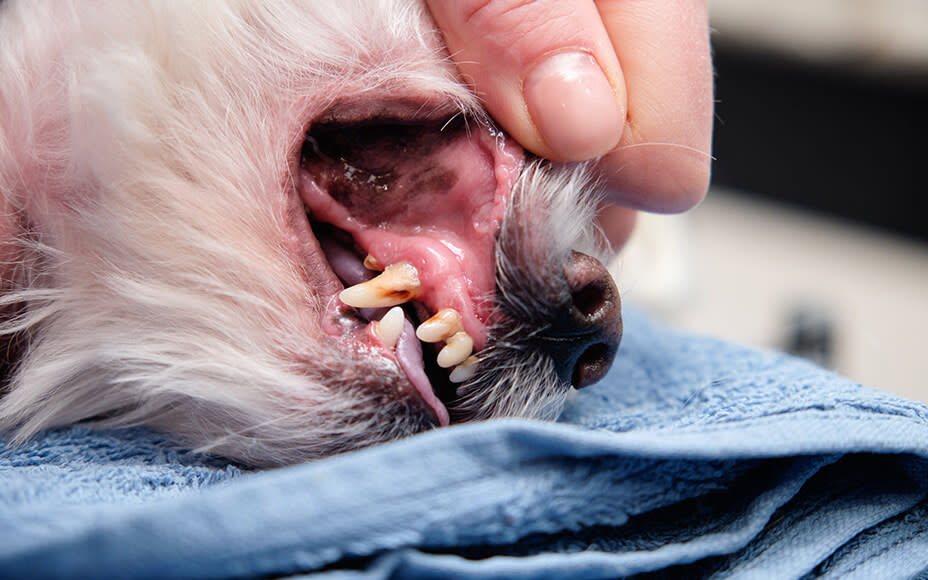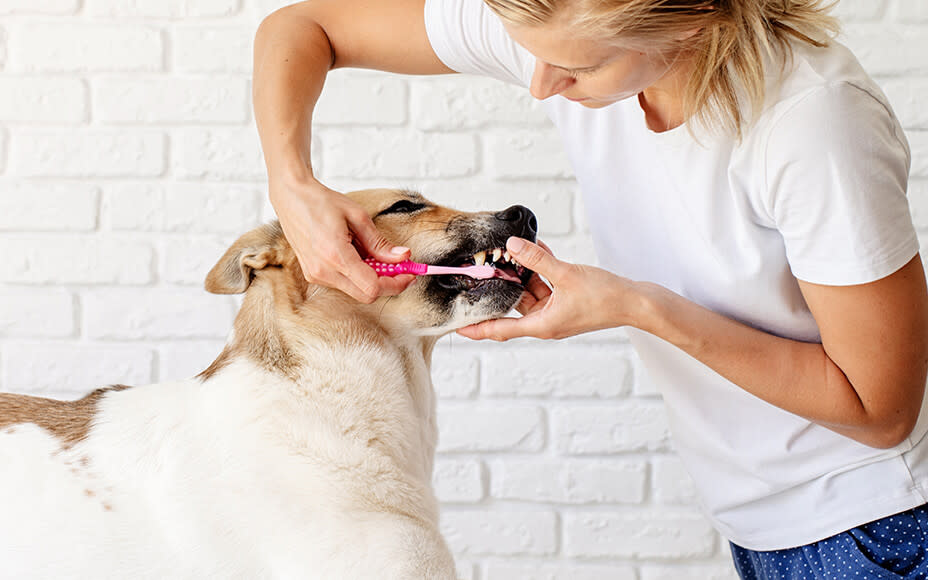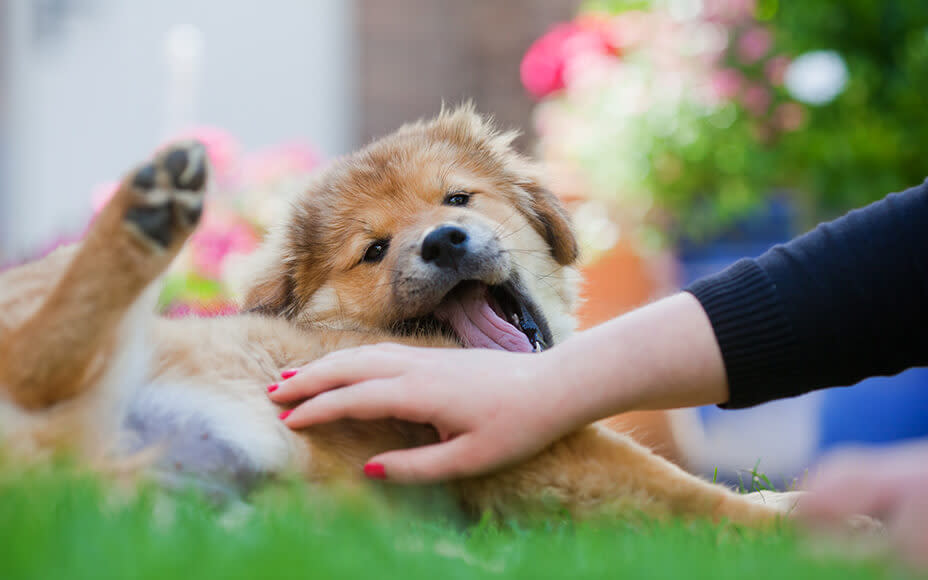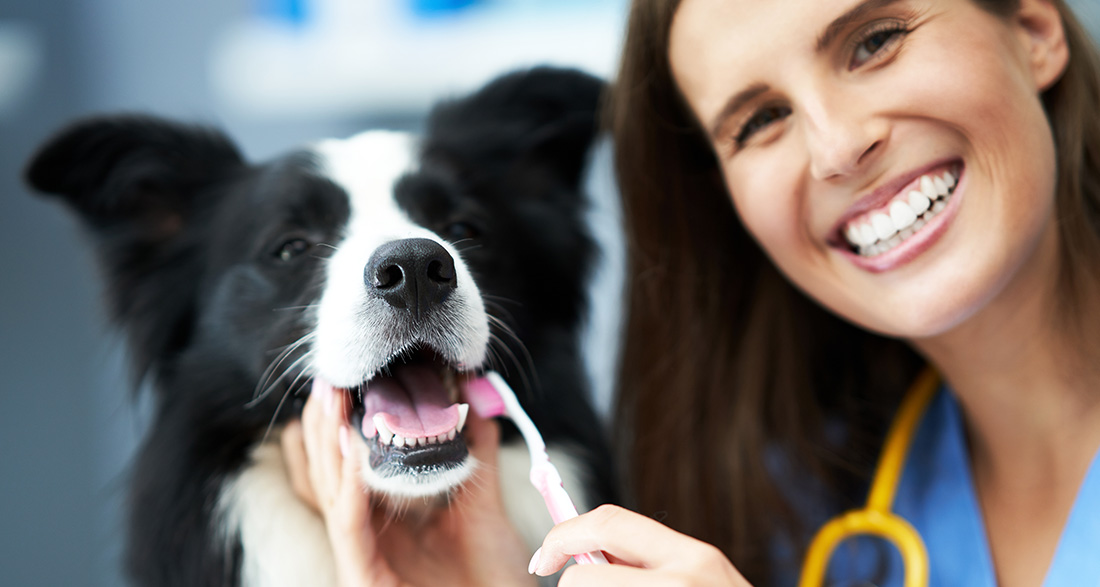The foul-smelling bad breath of your dog has you almost passing out? Get to the bottom of the issue (or rather, the stench) and find out what you can do against bad breath.
When is bad breath normal for dogs?
If a friendly greeting, a hearty yawn, or a little burp cause a stink for you and your four-legged friend, then bad breath is in the air. A bit of bad breath, just like in humans, is sometimes normal. For example, if your furry friend has just enjoyed a delightful nap or had something tasty, he might have a slightly strong odor from his mouth. In such cases, letting the dog drink some water usually helps.
However, if foul-smelling breath prevents little Fido from cuddling on the sofa, it’s time to pay attention. Persistent bad breath is a sign that something is amiss.

Bad breath due to food
Similar to us not smelling so pleasant from the mouth if we indulged in a kebab with extra garlic sauce the day before, your dog might have a slightly stronger mouth odor after enjoying a delicious piece of tripe, for example. However, this bad breath should typically go away on its own after a short time.
It’s different when the bad breath is persistent. In such cases, it’s worth taking a critical look at your dog’s food. Ingredients like grains, sugar, and vague terms like “animal by-products” should not be part of it. Poor-quality food and table scraps have a negative impact on your pet’s oral flora, promoting bacterial growth, which, in turn, can lead to bad breath.
With a healthy diet featuring high-quality ingredients, you can ensure that your furry friend smells less. Not only bad breath, but a strongly smelling coat can also be a sign of poor-quality food. At iHugDogs, we understand the importance of a high-quality composition and quality in pet food. That’s why only carefully selected ingredients end up in the bowl!
Bad breath in dogs due to poor oral hygiene
However, the most common causes of persistent bad breath in dogs are diseases in the mouth and throat area. These include dental plaque, tartar, and, in the worst case, rotten teeth and gum diseases like periodontitis.
A coating, called plaque, forms on the teeth due to food residues combined with saliva. If this is not removed, for example, through harder chew treats or regular dental care, the plaque can harden, forming tartar.
If tartar is left untreated for a long time, it promotes further bacterial accumulation in the oral cavity and can lead, as you might suspect, to strong bad breath and, worse yet, to chronic gum inflammation. If you notice yellow deposits on your dog’s teeth and/or if he refuses his usual dry food, these are signs of dental problems. In this case, you should have your pet examined by veterinarians.

Injuries to the oral cavity
Sticks, balls, bones… our dogs put all sorts of things in their mouths. This can sometimes lead to minor injuries. Even when roughhousing with dog buddies, a scratch in the mouth can occur. Smaller, sore spots usually heal well on their own. However, in the case of larger wounds or if you suspect that your dog has swallowed an object, you should take him to a veterinary clinic and have him examined.
Viruses and bacteria
You have already learned how bacteria can accumulate in your dog’s mouth and cause bad breath. But viruses like the herpes virus, for example, are also often responsible for bad breath in dogs.
Your dog can pick up viruses almost anywhere – from other animals, from a puddle, or while sniffing or nibbling on feces. Viruses weaken the immune system, giving bacteria the opportunity to multiply excessively. This also requires medical treatment to make your furry friend feel better and eliminate bad breath.
Teething in puppies
A stronger mouth odor can also occur during the teething period in puppies. The milk teeth slowly loosen, your dog rubs and scratches at his mouth more because it itches and hurts. Also, chewing on hands or other objects is not uncommon. This can lead to inflammation and bleeding in the gums, combined with trapped food residues, creating an ideal breeding ground for bacteria. The result: foul-smelling bad breath.

Initially, a bit of bad breath during teething is not overly concerning. However, if the problem persists even after teething, the vet should take a look into the oral cavity. Perhaps a milk tooth has not fallen out or has broken off and is now infected.
Quick tip:
A teething puppy wants to chew and gnaw a lot. During this time, you can help your pet endure the pain with special chew toys or healthy chew treats.
More serious illnesses
Even though in most cases, something less serious like dental plaque is the cause of bad breath in dogs, more serious illnesses cannot be ruled out. Infrequently, a disease in other organ systems such as the liver or kidneys is responsible for bad breath. Possible diseases include:
- Severe inflammations of the mouth and throat, such as a purulent tonsillitis
- Tumors in the mouth, throat, or neck area
- Fungal infection of the oral mucosa
- Digestive system diseases, for example, diabetes
- Kidney or liver diseases
To detect or rule out a more serious illness in a timely manner, you should not ignore persistent bad breath in your dog. Get to the bottom of the issue and have your furry friend checked out by veterinarians. Many diseases are well treatable if detected early, and your pet will soon have minty-fresh breath again!


